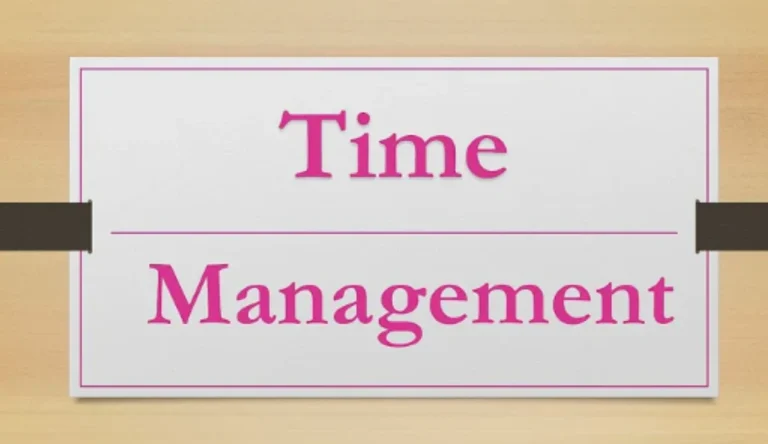Why Time Management Is Important In Recovery
Why Time Management Is Important In Recovery? In the journey of recovery, time is both a precious resource and a powerful symbol. It represents the opportunity for growth, healing, and transformation. Just as each passing moment carries with it the potential for change, effective time management becomes an essential tool in your pursuit of recovery.
When you prioritize your time wisely, you are making a conscious decision to invest in yourself and your well-being. By setting goals and establishing priorities, you create a roadmap for success that will guide you along the path to healing. A structured daily schedule provides stability and routine in a world that may have once felt chaotic.
But time management isn’t just about filling every minute with tasks; it’s also about carving out moments devoted to self-care and wellness activities. These acts of self-nurturing are crucial in replenishing your emotional reserves and maintaining balance amidst life’s challenges.
Attending therapy sessions and support groups require dedicated time commitments too. These invaluable resources provide guidance, encouragement, and understanding from professionals and peers who share similar experiences. By actively engaging in these sessions, you open yourself up to valuable insights that can propel your recovery forward.
Embracing productive and meaningful activities not only keeps you focused but also helps build confidence as you witness tangible progress. Whether it’s pursuing hobbies or volunteering within your community, utilizing your time effectively allows you to make positive contributions while gaining a sense of fulfillment.
Procrastination is often an enemy of progress, so learning how to avoid wasting time becomes paramount on this journey. Engaging in mindless distractions or succumbing to old patterns can hinder personal growth; however, by consciously allocating your time toward healthier choices, you empower yourself to stay on track towards lasting change.
Lastly, maintaining consistency through accountable practices reinforces commitment to recovery over the long term. When others see that you value their time as much as yours—and when they know they can count on you—it fosters trust within relationships built on mutual support.
Time management is an essential aspect of recovery that symbolizes your commitment to personal growth and transformation. By effectively managing your time, you create space for healing, self-care, and meaningful connections. Embrace the power of time and make every moment count on this remarkable journey towards wholeness.
Key Takeaways
- Time management in recovery is crucial for growth and transformation.
- Prioritizing self-care and wellness activities is essential for emotional replenishment.
- Engaging in productive activities helps build confidence and achieve tangible progress.
- Avoiding procrastination and wasting time is important for personal growth.
Establishing Priorities and Setting Goals
You need to prioritize your recovery and set clear goals in order to regain control of your life and feel a sense of accomplishment. Goal setting strategies are essential during the recovery process as they provide direction and motivation.
Start by identifying what is most important to you in your recovery journey. This could be improving physical health, rebuilding relationships, or finding employment. Once you have identified your priorities, break them down into smaller, manageable tasks. This will help you stay focused and prevent overwhelm.
Prioritizing tasks is crucial as it allows you to allocate your time and energy effectively. Consider using techniques like creating a daily to-do list or utilizing time management apps to keep yourself organized.
Remember, each small step towards your goals is a victory on its own, so celebrate every milestone along the way!
Creating a Structured Daily Schedule

Start your day off on the right foot by establishing a structured daily schedule that sets you up for success in your journey towards healing and growth.
Setting boundaries and managing distractions are essential components of time management in recovery. By creating a structured daily schedule, you give yourself a clear roadmap to follow, helping you stay focused and motivated.
Here are three key benefits of having a structured daily schedule:
- Increased productivity: With a schedule in place, you can allocate specific time slots for different activities, making sure everything gets done efficiently.
- Improved self-discipline: Following a set routine helps you develop self-discipline, as it requires sticking to predetermined tasks and prioritizing important activities.
- Reduced stress: A well-planned schedule allows you to anticipate potential challenges or conflicts, enabling you to better manage your time and minimize stress.
By implementing a structured daily schedule, you take control of your time, prioritize what matters most to your recovery, and create an environment conducive to personal growth.
Allocating Time for Self-Care and Wellness Activities
Establishing a structured daily schedule is like creating a well-oiled machine, ensuring that you allocate dedicated moments throughout the day for self-care and wellness activities. It’s important to strike a balance between fulfilling your responsibilities and taking care of yourself.
By allocating time specifically for self-care, you’re prioritizing your well-being and acknowledging its importance in your recovery journey.
Incorporating relaxation techniques into your daily routine can greatly benefit your overall mental and physical health. Whether it’s practicing deep breathing exercises, engaging in mindfulness activities, or simply taking a walk outdoors, these moments of relaxation allow you to recharge and rejuvenate. They provide an opportunity to release stress and anxiety, promoting a sense of calmness and clarity.
Remember that self-care isn’t selfish; it’s essential for maintaining stability and preventing burnout. Allocating time for self-care allows you to show up fully for yourself and others, ultimately contributing to your long-term recovery success.
So make sure to carve out those precious moments each day to prioritize your well-being.
Attending Therapy Sessions and Support Groups
Attending therapy sessions and support groups can provide you with a valuable space to explore your emotions and connect with others who understand your journey, fostering growth and resilience.
Here are four reasons why seeking professional help and building a support network is crucial in your recovery:
- Expert guidance: Therapists and counselors have the knowledge and skills to guide you through the healing process, helping you gain insight into your struggles and develop effective coping strategies.
- Validation and understanding: Being surrounded by individuals who share similar experiences creates a sense of belonging. You’ll find solace in knowing that you’re not alone on your journey towards recovery.
- Emotional release: Therapy sessions offer a safe environment where you can freely express yourself without fear of judgment or criticism. This emotional release can be incredibly cathartic and aid in processing difficult emotions.
- Accountability: Attending regular therapy sessions or support group meetings helps keep you accountable for your progress. It provides structure, motivation, and encouragement to stay committed to your recovery goals.

Remember, seeking help is not a sign of weakness but rather an act of strength as it shows that you’re actively taking steps towards healing and reclaiming control over your life.
Engaging in Productive and Meaningful Activities
Engaging in productive and meaningful activities can be a powerful tool in your healing journey, providing a sense of purpose and fulfillment. For example, imagine a survivor of trauma finding solace and empowerment through painting, using vibrant colors to express their emotions and reclaim their identity.
| Pursuing Hobbies | Volunteering Opportunities |
|---|---|
| Engage in activities you enjoy | Give back to the community |
| Rediscover your passions | Make a difference in the lives of others |
| Explore new interests | Gain new perspectives |
| Find joy and relaxation | Develop skills and gain experience |
| Boost self-esteem and confidence | Connect with like-minded individuals |
By pursuing hobbies or exploring volunteering opportunities, you create space for personal growth while connecting with others who share similar interests or goals. Engaging in these activities offers an opportunity to take your mind off negative thoughts, improve mental well-being, build resilience, and develop a support network.
Whether it’s painting, dancing, playing an instrument or helping out at a local charity organization, investing time into meaningful activities can greatly contribute to your recovery process. Remember to prioritize yourself by incorporating these activities into your schedule as part of effective time management.
Avoiding Procrastination and Time Wasting Behaviors
Don’t let procrastination and time-wasting habits hinder your progress in the healing journey; instead, find strategies to stay focused and make the most of your valuable moments. Overcoming distractions is crucial when it comes to managing your time effectively during recovery.
Here are some tips to help you increase productivity:
- Prioritize tasks: Identify what needs to be done first and focus on completing those tasks before moving on to others.
- Set achievable goals: Break down larger goals into smaller, more manageable ones. This will help you stay motivated and avoid feeling overwhelmed.
- Create a schedule: Plan out your day in advance, allocating specific times for different activities. Stick to this schedule as much as possible.
By implementing these strategies, you can avoid wasting time on unnecessary activities and ensure that every moment counts towards your recovery journey. Remember, progress takes effort, but with effective time management, you have the power to maximize your potential.
Maintaining Consistency and Accountability
To maintain consistency and hold yourself accountable, make sure you create a schedule that outlines specific tasks and allocate time for each activity. Building healthy habits is crucial in the recovery process, and having a structured routine can greatly assist in establishing those habits.
By allocating specific time slots for activities such as exercise, therapy sessions, or self-care practices, you are more likely to follow through with them consistently. This helps to reinforce the positive behaviors that contribute to your recovery. Additionally, tracking your progress is an essential part of maintaining accountability. You can use a simple table like the one below to visually represent your goals and achievements:
| Activity | Time Allocated |
|---|---|
| Exercise | 30 minutes |
| Therapy session | 1 hour |
| Meditation | 15 minutes |
By regularly updating this table and tracking your progress, you can see how far you’ve come and stay motivated on your journey towards recovery. Remember, every step forward counts!
Frequently Asked Questions
Conclusion
In conclusion, remember that time is a precious resource on your recovery journey. By managing it effectively, you can create a roadmap to success and achieve your goals.
Picture yourself balancing different tasks and responsibilities like a skilled juggler, effortlessly moving from one to another with grace and ease. With each step forward, you’re building a stronger foundation for your well-being.
Trust in the power of time management as it guides you towards a brighter future filled with growth, healing, and fulfillment. Keep going, ’cause you’ve got everything it takes to succeed.






